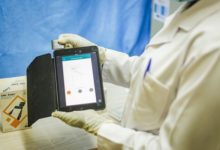Digital health among the top agenda at the AfricaCom 2017 conference

Mobile technology is, without doubt, the next great ‘enabler’ in healthcare in Africa. A mobile phone has become a biosensor, a laboratory, a scanner and a data processor and e-Health is rapidly proving its potential to improve workplace efficiencies, increase patient safety, better coordinate care, facilitate payments and engage patients.
The continent’s single largest and most ‘connected’ technology, media and telecommunications event, AfricaCom – now in its 20th year – will spotlight the rise of digital health and attendant technologies, with a brand new dedicated conference track.
“We have included several new tracks on the conference agenda this year, with e-Health a prominent addition,” says Tom Cuthell, Portfolio Director at KNect365. “With more people finally having access to the immediacy and the information that the Internet brings, personal health management is becoming achievable and is set to be one of the fastest growing industry sectors over the next few years.
“This presents incredible opportunities for the entire health and wellness ecosystem and we look forward to hosting healthy and robust discussions on these topics and many others at this year’s event.”
Topics on the agenda for a full day of rigorous debate and healthy insight, on Tuesday 7th November 2017, include a look at the current digital health landscape and the opportunities that are available and what needs to be done to address the challenges of implementing these new ideas.
Ways in which digital transformation can improve healthcare access and service delivery in Africa will also be up for discussion, with themes that include how mobile, IoT, Big Data and the cloud, will impact healthcare in Africa; developing a digital health strategy for healthcare organisations; and integrating digital health into national healthcare systems (across the continent).
During the Connecting Africa Digital Week, (4-8 September), eHealth News, as well as the hearX Group and Vula Mobile, tracked the rise of Digital Health Clinics and showcased the e-Health technologies making this possible.
“e-Health development needs a combined approach, with numerous collaborators and contributors who are all aligned to solving a problem for an individual, a community, a region and eventually, an entire health system,” said Ophthalmology Registrar at Stellenbosch University and Founder of Vula Mobile, Dr. William Mapham.
Read>> This new electronic health solution helps doctors monitor patients after they have left the hospital
Mapham’s award-winning Vula e-Health App plays an important role in providing health workers – particularly those in remote rural areas – with a tool that helps to get patients quick and efficient specialist care.
“Inefficient referral networks are a drain on resources. We’re hoping that by applying mobile technologies to this issue, Vula can play a part in improving the way referrals are made and creating more robust health systems,” explains Dr Mapham.
Future trends in healthcare delivery in Africa will be driven by access to e-Health technologies, to shape new models of care in driving innovative, affordable and accessible services. As demand for healthcare rises, the pressure to reduce cost and show value increases. Technology not only addresses key healthcare problems in developing economies but adds value too.
Joining Mapham in discussion, are among others: Taryn Springhall, Editor, eHealth News, Professor De Wet Swanepoel, Professor, University of Pretoria, Founder & Scientific Advisor at hearX Group as well as Adama Kane, CEO of Jokko Santé.
Read >> Security Dominates as the Middle East and Africa Healthcare Goes Mobile
Featured Image: /iq.intel.com




